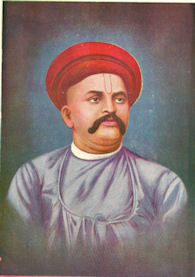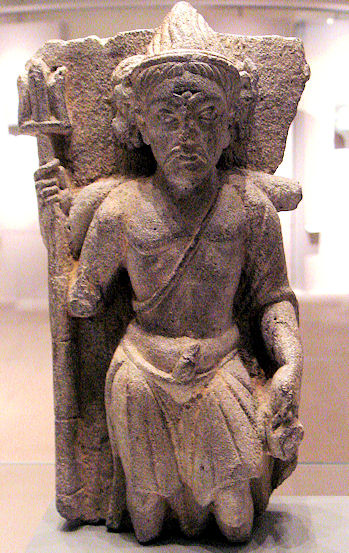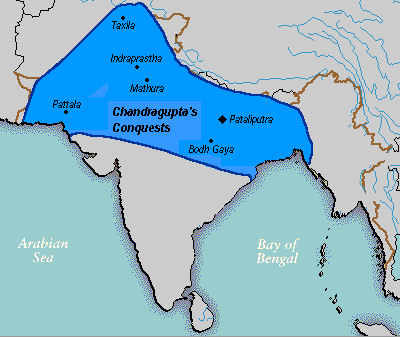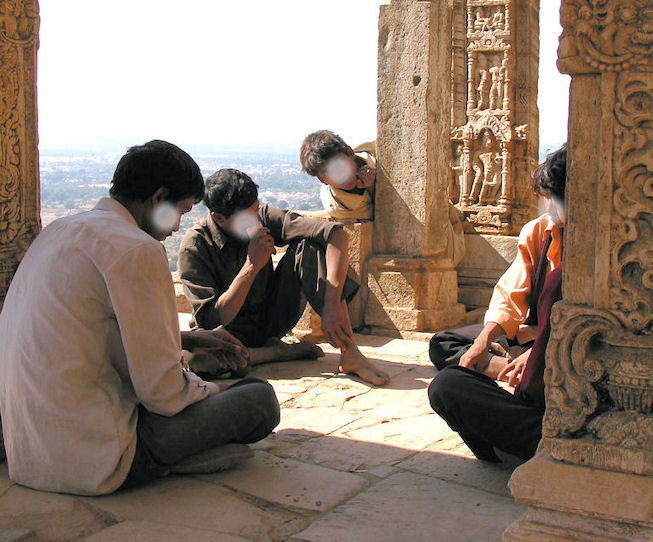

Mit den Auflösungen nach dem "Key" neu herausgegeben von Alois Payer
Zitierweise | cite as:
Apte, Vaman Shivaram <1858 - 1892>: The student's guide to Sanskrit Composition (Being a treatise on Sanskrit Syntax). -- 3. ed. -- 1890. -- 09. Lesson IX. -- Fassung vom 2010-02-17. -- URL: http://www.payer.de/apte/apte09.htm
Ursprünglich erschienen als:
Apte, Vaman Shivaram <1858 - 1892>: The student's guide to Sanskrit composition : being a treatise on Sanskrit syntax ; for the use of schools and colleges. -- 3rd ed. -- Poona : R. A. Sagoon, 1890. -- 450 S.
A Key to Apte's Guide to Sanskrit composition : giving a close rendering into English and Sanskrit of all the Sanskrit and English sentences / compiled by an experienced graduate teacher. -- 2d ed. -- Bombay : Standard Pub., 1923. -- 136 p. ; 18 cm
Erstmals hier publiziert: 2010-02-17
Überarbeitungen:
©opyright: Public domain
Dieser Text ist Teil der Abteilung Sanskrit von Tüpfli's Global Village Library
Falls Sie die diakritischen Zeichen nicht dargestellt bekommen, installieren Sie eine Schrift mit Diakritika wie z.B. Tahoma.
Die Devanāgarī-Zeichen sind in Unicode kodiert. Sie benötigen also eine Unicode-Devanāgarī-Schrift.
Use of brackets:
<> = Apte`s own Notes (loc. cit. pp. 277ff.)
[] = A Key to Apte's Guide to Sanskrit composition : giving a close rendering into English and Sanskrit of all the Sanskrit and English sentences / compiled by an experienced graduate teacher. -- 2d ed. -- Bombay : Standard Pub., 1923. -- 136 p. ; 18 cm
{} = Notes by Alois Payer
§ 87. The place, in or on which an action is represented as taking place, is called अधिकरण, and is put in the Locative case; as, स्थाल्यामोदनं पचति 'cooks food in a cooking-utensil'; आसने उपविशति 'sits on a seat.'
(a) The Locative is used to denote the time when an action takes place; as, आषाढस्य प्रथमदिवसे (Meghadūta 2) 'on the first day of Āṣādha'; so शैशवे ऽभ्यस्तविद्यानां यौवने विषयैषिणाम् (Raghuvaṃśa I.8) ['Who acquired knowledge in childhood and sought after worldly pleasures in youth.'].
§ 88. The Locative has very often the sense of 'towards,' 'about,' 'as to' &c.; as, मयि मा भूरकरुणा (Mālatīmādhava 9) 'be not ruthless towards me'; विषयेषु विनाशधमसु निःस्पृहो ऽभवत् (Raghuvaṃśa VIII.10) 'became free from desire for perishable objects.' [विनाशधर्मसु - विनाशो धर्मः natural property येषां. निर्गता स्पृहा यस्य निःस्पृहः।]

Abb.: मयि मा भूरकरुणा
Fort, Hansi (हान्सी), Haryana (हरियाणा,
ਹਰਿਆਣਾ,
ہاریانا)
[Source: Saad.Akhtar. --
http://www.flickr.com/photos/saad/113689966/. -- Downloaded on 2010-02-10.
-- Creative
commons license (attribution, no commercial use, no derivative works)]
§ 89.1 With adjectives in the superlative degree, and in those cases where a distinction is made, as of an individual from his whole class, (generally expressed by 'of', or 'among' in English), the nouns, with respect to which such pre-eminence or distinction is shown, are put in the Genitive or Locative; as, गवां गोषु वा कृष्णा बहुक्षीरा (Siddhāntakaumudī) 'among cows the black one gives much milk'; so नृणां नृषु वा द्विजः श्रेष्ठः (ibid.) {'among men the Brahmin is the best'}.
1 यतश्च निर्धारणम् {षष्ठी-सप्तम} (Pāṇini II.3.41) {'The sixth and the seventh case affixes are used after those words from which specification is made, (as of an individual from the whole class). transl. Vasu, 1891}
§ 90.1 Word expressive of the interval of time or space are put in the Ablative or Locative, as अस्मिन्दिने भुक्त्वायं त्र्यहात् त्र्यहे वा भोक्ता (Siddhāntakaumudī) [त्र्यहात् - त्रयाणामह्नां समाहारः।] 'having dined to-day, he will dine again after (the interval of) three days;' इहस्थो ऽयं क्रोशात्क्रोशे वा लक्ष्यं विध्येत् (Siddhāntakaumudī) 'standing here, he will hit a mark at (the distance of) one Koss.'
1 सप्तमीपञ्चम्यौ कारकमध्ये । (Pāṇini II.3.7) {'A noun denoting time or place gets the affix of the seventh or the fifth case, when the sense implied is that the time or space is the interval between one action and another action (or implies an interval of time and space between two kārakas).' Transl. Vasu, 1891}
§ 91. This case is used in lexicons to denote 'in the sense of;' as बाणो बलिसुते शरे (Amarakośa) 'बाण is used in the sense of 'son of Bali', and 'an arrow'.
{बलिसुत = बाणासुर
"Bāṇa. A Daitya, eldest son of Bali, who had a thousand arms. He was a friend of Śiva and enemy of Viṣṇu. His daughter Uṣā fell in love with Aniruddha, the grandson of Kṛṣṇa, and had him conveyed to her by magic art. Kṛṣṇa, Balarāma, and Pradyumna went to the rescue, and were resisted by Bāṇa, who was assisted by Śiva and Skanda, god of war. Śiva was overpowered by Kṛṣṇa; Skanda was wounded; and the many arms of Bāṇa were cut off by the missile weapons of Kṛṣṇa. Śiva then interceded for the life of Bāṇa, and Kṛṣṇa granted it. He is called also Vairoci." [Source: Dowson, John <1820 -1881>: A classical dictionary of Hindu mythology and religion, geography, history, and literature. -- London: Trübner, 1879]}
§ 92. The Locative is sometimes used to denote the object or purpose for which anything is done; as, चर्मणि द्वीपिनं हन्ति दन्तयोर्हन्ति कुञ्जरम् । केशेषु चमरीं हन्ति सीम्नि पुष्कलको हतः (Mahābhāṣya) 'man kills the tiger for skin, the elephant for tusks, the Camarī for hair, and the musk dear for musk.'
{चमरी = female yak (Tibetan འབྲི ’bri ) = Bos grunniens L.
चमरी = female yak (Tibetan འབྲི ’bri ) = Bos grunniens L.
Koko Nor (青海湖)
[Source: B_cool. -- http://www.flickr.com/photos/34323424@N00/529461706. -- Downloaded on 2010-02-11. -- Creative commons license (attribution)]सीमन् = मुष्क = scrotum, here: gland of the male musk deer, which is situated between its back/rectal area.
पुष्कलक = musk deer = Moschus moschiferus
Abb.: पुष्कलक = musk deer = Moschus moschiferus
[Source: Meyers Großes Konversationslexikon, 1905]}
§ 93. Words meaning 'to act', 'to behave', 'to deal with', are construed with the Locative; as, आर्यो ऽस्मिन्विन्येन वर्ततां (Uttararāmacarita) 'let your honour act modestly towards this person'; कथं कार्यविनिमयेन व्यवहरति मय्यनात्मज्ञः (Mālavikāgnimitra 1) [अनात्मज्ञः - आत्मानं जानातीति आत्मज्ञः One who knowes one's interest.] 'Oh! Does the fool deal with me by an exchange of duties?'; कुरु प्रियसखीवृत्तिं सपत्नीजने (Śakuntalā 4) 'act the part of a dear friend towards the rival wives.'
§ 94. Words signifying 'love,' 'attachement,' 'respect,' such as स्निह्, अभ्लष्, अनुरञ्ज् &c. govern the Lओcative of the person or thing for whom or which the 'love' &c. is shown; as, किं नु खलु बाले ऽस्मिन्स्निह्यति मे मनः (Śakuntalā 7) 'why, indeed, does my mind love this child?'; न तापसकन्यकायां शकुन्तलायां ममाभिलाषः (Śakuntalā 2) 'I cherish no love for Śakuntalā the daughter of the sage'; स्वयोषिति रतिः (Nītiśataka 62) 'attachement to one's own wife'; दण्डनीत्यां नात्यादृतो ऽभूत् (Daśakumāracarita II.8) 'had no great regard for politics'; देवे चन्द्रगुप्ते दृढमनुरक्ताः प्रकृतयः (Mudrārākṣasa 1) 'the subjects are firmly attached (devotedly loyal) to His Majesty Candragupta;' अस्ति मे सोदरस्नेहो ऽप्येतेषु (Śakuntalā 1) 'I have also a sisterly affection for them'.
Obs. - Derivatives from अनुतञ्ज् are usually used with the Accusative; as, एषा भवन्तमनुरक्ता (Śakuntalā 6); अपि वृषलमनुरक्ताः प्रकृतयः (Mudrārākṣasa 1). In such cases अनु must be taken separately, and understood as कर्मप्रवचनीय governing the Accusative case. See § 37.
§ 95. When a word indicating 'cause' is used, the 'effect' is often put in the Locative; as, दैवमेव हि नृणां वृद्धौ क्षये कारणं (Nītiśatakam 84) 'fate alone is the cause of decline and prosperity (rise and fall) of men'.
§ 96. The root युज् and its derivatives govern the Locative o0f the thing in the sense of 'to' in English; as, असाधुदर्शी तत्रभवान्काश्यपो य इमामाश्रमम्धर्मे नियुङ्क्ते (Śakuntalā 1) 'the revered Kāśyapa is not prudent, as he appoints her to the duties of the hermitage.'
(a) With words expressive of 'fitness', 'suitableness' &c., the nouns regarding which the fitness is expressed are put in the Locative case; as, युक्तरूपमिदं त्वयि (Śakuntalā 2) 'this is fit for thee'; त्रैलोकस्यापि प्रभुत्वं तस्मिन्युज्यते (Hitopadeśa 3) 'the sovereignity of even the three worlds suits him'; अथवोपपन्नमेतदृषिकल्पे ऽस्मिन्राजनि (Śakuntalā 2) 'or this is quite proper for this sage-like king'; ते गुणाः परस्मिन्ब्रह्मण्युपपद्यन्ते (Śāṅkarabhāṣya 190) 'those attributes suit the Supreme Brahma.'
Obs. The Genitive is not infrequently used in the same sense; as, उपपन्नमिदं विशेषणं वायोः (Vikramorvaśīya 2) 'this epithet suits the wind.'
§ 97. The Locative, strictly speaking, implies place, but in several cases it is used with the object or recipient to which anything is entrusted or imparted; as, शुकनासनाम्नि मन्त्रिणि राज्यभारमारोप्य यौवनसुखमनुबभूव (Kādambarī 57) 'having entrusted the responsibilities of the kingdom to his minister, Śukanāsa, (he) enjoyed the pleasures of youth'; वितरति गुरुः प्राज्ञे विद्यां यथैव तथा जडे (Uttararāmacarita 2) 'a preceptor imparts instruction to a clever person in the same way as he does to a dull-headed one'; so, योग्यसचिवे न्यस्तः समस्तो भरः (Ratnāvalī 1) ['The entire burden (of government) entrusted to a proper minister.']
Note. तॄ with वि is used with the Dative also; as, मह्यं तं व्यतरन् (Daśakumāracarita I.1) 'gave him over to me'; so, मारीचस्ते दर्शनं वितरति (Śakuntala 7) ['Mārīca grants you an interview.']
(a) Roots implying 'to seize' or 'to strike', often govern the Locative of that which is caught hold of or struck; as, आर्तत्राणाय वः शस्त्रं न प्रहर्तुमनागसि (Śakuntalā 1) 'your weapon is for protecting the distressed, and not for striking the innocent;' केशेषु गृहीत्वा 'seizing by the hair.'
§ 98. Words like क्षिप्, मुच्, अस्, having the sense of 'throwing' or 'darting', govern the Locative of that against which anything is thrown; as, मृगेषु शरान्मुमुक्षोः (Raghuvaṃśa IX.58) 'of him who wished to throw arrows at the deer;' न वाणः संनिपात्यो ऽस्मिन्मृगशरीरे (Śakuntalā 1) 'an arrow should not be discharged at this body of the deer.'
(a) Words implying 'belief,' 'confidens,' generally govern the Locative of that in which belief is placed; as, पुंसि विश्वसिति कुत्र कुमारी (N. V. 100) 'when does a virgin ever believe in man?'
Obs. श्रद्धा governs the Accusative; as, कः श्रद्धास्यति भूतार्थं (Mṛcchakaṭika 3) 'who will believe the real state (of things)?'
§ 99.1 Words like अधीतिन् 'who has learnt', गृहीतिन् 'who has comprehended,' govern the Locative of that which forms their object; and साधु and असाधु, of that towards whom the goodness or otherwise is shown; as, अधीती चतुर्ष्वाम्नायेषु (Daśakumāracarita II.5) 'versed in the four Vedas'; गृहीती षत्स्वङ्गेषु (ibid.) 'who has mastered the six Vedāṅgas;' मातरि साधुरसाधुर्वा (Siddhāntakaumudī) 'well behaved or ill behaved towards his mother.'
1 क्तस्येन्विषयस्य कर्मण्युपसंख्यानम् । साध्वसाधुप्रयोगे च । (Vārtika)

Abb.: मातरि साधुः
एलीफेंटा
[Source: madmonk. --
http://www.flickr.com/photos/zarwan/2768063584/. -- Downloaded on
2010-02-12. --
Creative
commons license (attribution, noncommercial, no derivative works)
§ 100. Words like व्यापृत, आसक्त, व्यग्र, तत्पर, having the sense of 'engaged in,' 'intent on,' and कुशल, निपुण, शौण्ड, पटु, प्रवीण, पण्डित, meaning 'skilful,' and धूर्त and कितव meaning 'a rogue,' are used with the Locative; as, गृहकर्मणि व्यापृता व्यग्रा वा (Pañcatantra II.) 'engaged in her household duties;' रामो ऽक्षद्यूते निपुणः - प्रवीणः (Siddhāntakaumudī) 'Rāma is skilful in playing at dice.'
(a)1 The words प्रसित and उत्सुक meaning 'greatly desirous of,' 'longing for', govern the Locative or Instrumental; as, निद्रायां निद्रया वा उत्सुकः (Siddhāntakaumudī) 'longing for sleep'; so मनो नियोगक्रिययोत्सुकं मे (Raghvaṃśa V,11) {'My mind longs for the execution of the command.'}
1 प्रसितोत्सुकाभ्यां तृतीया च । (Pāṇini II.3.44) {'In conjunction with the words prasita 'longing for,' and utsuka 'greatly desirous of;' the third case affix is used after a word, as well as the seventh.' Transl. Vasu, 1891}

Abb.:
निद्रायां निद्रया वा उत्सुको मार्जारः
[Source: tanakawho. --
http://www.flickr.com/photos/28481088@N00/2339909977/. --
Downloaded on 2010-02-15. --
Creative commons
license (attribution, no commercial use)]
Note. - राध् with अप in the sense of 'to offend' generally governs the Locative in the sense of the Accusative, and sometimes the Genitive; as, कसमिन्नपि पूजार्हे ऽपराद्धा शकुन्तला (Śakuntalā 4) 'Śakuntalā has offended (erred with respect to) some one deserving respect'; so अपराद्धो ऽस्मि तत्रभवतः कण्वस्य (Śakuntalā 7) {'I have offended the revered Kaṇva.'}
प्रथितयशसां भासकविसौमिल्लकविमिश्रादीनां पबन्धानतिक्रम्य वर्तमानकवेः कालिदासस्य क्रियायां कथं परिषदो बहुमानः ॥१॥ (Mālavikāgnimitra 1)
<Notes: वर्तमानकवि 'a living or contemporary poet.'>
[Key: How is it that the audience has a great regard for (highly esteems) the composition of Kālidāsa, a poet of the present day, leaving aside the works of great (मिश्र) poets, Bhāsa, Saumilla and others, so well known to fame (lit. whose fame is spread).]
{Saumilla / Somila: author (together with Rāmila) of the lost Śūdrakakathā.}
यः पौरवेण राज्ञा धर्माधिकरि नियुक्तः सो ऽहमविघ्नक्रियोपलम्भाय धर्मारण्यमिदमायातः ॥२॥ (Śakuntalā 1)
[Key: न विद्यते विघ्नो यास्यां सा अविघग्ना ; अविघ्नाश्च ताः क्रियाश्च तासामुपलम्भाय । धर्मस्य धर्मप्र्धानं वारण्यं.
I am the person appointed by the king of the Puru race to superintend religious matters who who have come to this holy forest to see if the religious rites are performed without obstacles.]
दृढं त्वयि बद्धभावोर्वशी । न सेतोगतमनुरागं शिथिलयति ॥३॥ (Vikramorvaśīya 2)
<Notes: बद्धभावा 'has fixed affection' on you. इतोगतं = त्वयि आहितं.>
[Key: बद्धो भावः love यया । इतः गतः इतोगतः ।
Deep is the affection fixed on you by Ūrvaśī. She will not slacken her love for you.]

Abb.: दृढं त्वयि बद्धभावोर्वशी ।
Painting by Raja
Ravi Varma (രാജാ രവി വര്മ)
(1848 - 1906)
[Source: Wikipedia. -- Public domain]
एष देवो रघुपतिस्तिष्ठति । स च स्निह्यत्यावयोरुत्कण्ठते च युष्मत्संनिकर्षस्य ॥४॥ (Vikramorvaśīya 6)
<Notes: Said by Lava to Kuśa.>
[Key: Here is king Raghupati. He loves us and is anxious to meet you (longs for your company).]
दुर्जनत्वं च भवतो वाक्यादेव विज्ञातं यदनयोर्भूपालयोर्विग्रहे भवद्वचनमेव निदानम् ॥५॥ (Hitopadeśa 3)
[Key: As to your wickedness is known from your speech itself, since your words are the cause of the fight between these two kings.]
एष धृष्टद्युम्नेन द्रोणः केशेष्वाकृष्यासिपत्रेण व्यापाद्यते ॥६॥ (Veṇīsaṃhāra 3)
[Key: Here is {Droṇa beeing killed by} Dhṛṣṭadyumna, seizing him by the hair.]
न जानामि केनापि कारणेनापहस्तितसकलसखीजनं त्वयि विश्वसिति मे हृदयम् ॥७॥ (Kādambarī 233)
[Key: अपहस्तितः सकलः सखीनां जनः सखीजनो येन Bahuvrīhi qualifying हृदयं ; or - जनः यस्मिन्कर्मणि Adv. comp.
I do not know (why it is); from some cause my mind having cast off all my friends feels confidence in you. Or My mind feels confidence in you in a manner in which all my friends are left off.]
उपकारिषु यः साधुः
साधुत्वे तस्य को गुणः ।
अपकारिषु यः साधुः स साधुः सद्भिरुच्यते ॥८॥ (Hitopadeśa 2)
[Key: What merit is there in the goodness of him who acts well towards his benefactors? He is called a good man by the wise who acts well towards those who maltreat him.]
न मातरि न डरिषु
न सोदर्ये न चात्मनि ।
विश्वासस्तादृशः पुंसां यावान्मित्रे स्वभावजे ॥९॥ (Hitopadeśa 1)
[Key: Not in the mother or wife or brother, or one's own self that confidence is felt by men which is felt in a natural friend.]
क्षमा शत्रौ च
मित्रे च यतीनामेव भूषणम् ।
अपराधिषु सत्त्वेषु नृपाणां सैव दूषणम् ॥१०॥ (Hitopadeśa 2)
[Key: Forgiveness towards foe or friend is an ornament to ascetics only; the same when shown towards guilty persons {beings} by kings constitutes a fault.]
वाञ्छा सज्जनसंगमे
गुणिगणे प्रीतिर्गुरौ नम्रता
विद्यायां व्यसनं स्वयोषिति रतिर्लोकापवादाद्भयम् ।
भक्तिः शूलिनि शक्तिरात्मदमने संसर्गमुक्तिः खलेष्व्
एते येषु वसन्ति निर्मलगुणास्तेभ्यो नरेभ्यो नमः ॥११॥ (Nītiśataka 62)
<Notes: संसर्गमुक्तिः खलेषु = खलसंसर्गमुक्तिः 'shunning the company of wicked people'>
[Key: A desire for the company of the good, liking for a multitude of meritorious men (or परगुणे - joy at the merits of others) ; humility towards one's preceptor (or elders), strong attachment to learning, love for one's wife, dread of public censure, devotion to Śiva, power to curb one's passion (self-control) and giving up the company of the wicked - a bow to those men in whom reside these spotless virtues.]

Abb.: भक्तिः शूलिन
Three-Headed Shiva, Gandhara, 2nd Century
[Source: PHGCOM / Wikipedia. -- GNU FDLicense]
संतानार्थाय विधये
स्वभुजादवतरिता ।
तेन धूर्जगतो गुर्वी सचिवेषु निचिक्षिपे ॥१२॥ (Raghuvaṃśa I.34)
<Notes: संतानार्थाय विधये 'for (the performance of) some rite, having for its object progeny.'>
[Key: सन्तानाय अयं सन्तानार्थः । or सन्तानमेवार्थः सन्तानर्थस्तस्मै ।
For the performance of some rite the object whereof was progeny, the heavy yoke (the responsibility) of governing the earth taken down from his arms was thrown upon (entrusted to) his ministers.]
भूतानां प्राणिनः
श्रेष्ठाः प्राणिनां बुद्धिजीविनः ।
बुद्धिमत्सु नराः श्रेष्ठा नरेषु ब्राह्मणाः स्मृताः ॥१३॥ (Manu I.96)
[Key: Of all beings those that breathe are the best (chief); of the breathing creatures that live by the power of reason (instinct) are the best; among animals gifted with the reasoning faculty, men are the best; among men the Brāhmaṇas are the best.]
अवैमि ते सारमतः खलु त्वां कार्ये
गुरुण्यात्मसमं नियोक्ष्ये ।
व्यादिश्यते भूधरतामवेक्ष्य कृष्णेन देहोद्वहनाय शेषः ॥१॥ (Kumārasambhava III.13)
<Notes: Said by Indra to Cupid, when entrusting to him a great mission. आत्मसमं 'you who are like myself.' भूधरतामवेक्ष्य 'seeing his capacity to hold up the earth.'>
[Key: आत्मना समः आत्मसमः तम् ।
I know thy power; hence, indeed, it is that I employ you, like myself (in my own capacity), in a responsible affair: Śeṣa is directed to support his body by Kṛṣṇa after observing his ability to sustain the earth.]
अशुद्धप्रकृतौ राज्ञि जनता नानुरज्यते ॥२॥ (Pañcatantra I.11)
[Key: न शुद्धा अशुद्धा, अशुद्धाः प्रकृतयो यस्य तस्मिन् । जनता the termination ता here means 'the multitude of' (समूहः); cf. बन्धुता, ग्रामता &c.
Men do not love a king, who has bad (corrupt) ministers.]
जनकानां रघूणां च
यत्कृत्स्नं गोत्रमङ्गलम् ।
तस्मिन्नकरुणे पापे वृथा वः करुणा मयि ॥३॥ (Uttararāmacarita 6)
<Notes: कृत्स्नं गोत्रमंगलं 'Sītā who formed the entire auspiciousness' of both the families.>
[Key: Vain (out of place) is your compassion for me, who have been cruel to her who was the sole blessing of the families of the Janakas and the Raghus.]
निर्गुणेष्वपि
सत्त्वेषु दयां कुर्वन्ति साधवः ।
न हि संहरते ज्योत्स्नां चन्द्र्श्चांडलवेश्मनि ॥४॥ (Hitopadeśa 1)
[Key: Good men take pity of creatures though void of merits; the moon, indeed, does not withdraw her light from the house of a Cāṇḍāla (pariah).]
इत्युक्तवन्तं
जनकात्मजायां नितान्तरूक्षाभिनिवेशमीशम् ।
न कश्चन भ्रातृषु तेषु शक्तो निषेद्धमासीदनुमोदितुं वा ॥५॥ (Raghuvaṃśa XIV.43)
<Notes: ईशं 'their lord,' i.e. Rāma. नितांत &c., 'who entertained a very cruel thought with respect to Sītā,' i.e. of abandoning her.]
[Key: नितान्तं रूक्षः अभिनिवेशो यस्य तम् ।
None of the brothers was able either to dissuade from or give his consent to (the intended purpose of) his brother, who had thus declared himself and whose firm resolve (intention) towards the daughter of Janaka (Sītā) was exceedingly cruel.]
परकर्मापहः
सो ऽभूदुद्यतः
स्वेषु कर्मसु ।
आवृनोदात्मनो रन्ध्रं रन्ध्रेषु प्रहरन् रिपून् ॥६॥ (Raghuvaṃśa XVII.61)
<Notes: परकर्मापहः 'destroying the works of his enemies.' c/d 'Striking his foes in their weak points, he covered his own weak ones.'>
[Key: परेषां कर्माणि अपहन्तीति परकर्मपहः ।
Diligently engaged in carrying out his own plans, he became the frustrater of his enemies' purposes; striking his enemies in their weak points he covered his own.]
भवति कमलालये
भृशमगुणज्ञासि ।
आनन्दहेतुमपि देवमपास्य नन्दं
रक्तासि किं कथय वैरिणि मौर्यपुत्रे ॥७॥ (Mudrārākṣasa 2)
<Notes: Said by Rākṣasa to Lakṣmī, with reference to the want of appreciation of merits shown by her in leaving Nanda and falling in love with Candragupta.>
[Key: कमलमालयो यस्याः सा कमलालया । जानातीति ज्ञा गुणानां ज्ञा गुणज्ञा न गुणज्ञा अगुणज्ञा । आनन्दस्य हेतुरानन्दहेतुः ।
O divine Goddess that hast the lotus for thy throne (Lakṣmī) thou art extremely averse to the recognition (appreciation) of merits. Having cast off king Nanda, though a source of delight (to thee), how are thou, tell me, attached to the son of Maurya?]

Abb.:
कमलालया
महालक्ष्मी देवी / by Sivadas (ശിവദാസ)
[Source: Wikipedia. -- Public domain]

Abb.: The Nanda Empire at its greatest extent under Dhana Nanda circa 323
BC.
[Source: Huuska / Wikipedia. -- Public domain]

Abb.: Candragupta's empire when he founded it circa 320 BC
[Source: Ellywa / Wikipedia. -- Public domain]
साक्षात्प्रियामुपगतामपहाय पूर्वं
चित्रार्पितां मुहुरिमां बहु मन्यमानः ।
स्रोतोवहां पथि निकामजलामतीत्य
जातः सखे प्रणयवान्मृगतृष्णिकायाम् ॥८॥ (Śakuntalā 6)
<Notes: Said to Vidūṣaka by Duṣyanta who was pleased with the picture of Śakuntalā, though he had himself first repudiated her when she came to him in person.>
[Key: चित्रे अर्पिता चित्रार्पिता । निकामं जलं ययां सा ताम् ।
Having first repudiated my beloved when she came to me in person and now thinking highly of her committed to a picture, I have become, o friend, (as it were) possessed of a longing for (the water of) the mirage.]
पोतो
दुस्तरवारिराशितरणे दीपो
ऽन्धकारागमे
निर्वाते व्यजनं मदान्धकरिणां दर्पोपशान्त्यै सृणिः ।
इत्थं तद्भुवि नास्ति यस्य विधिना नोपायचिन्ता कृता
मन्ये दुर्जनचित्तवृत्तिहरणे धाता
ऽपि
भग्नोद्यमः ॥९॥ (Hitopadeśa 2)
[Key: वारीणां राशिः वारिराशिः । दुस्तरश्चासौ वारिराशिः दुस्तरवारिराशिः । तस्य तरणे । अन्धकारस्यागमः अन्धकारागमः तस्मिन्सति । निर्गतो वातो यस्मात्तन्निर्वातम् । मदेनान्धाः मदान्धाः मदन्धाश्च ते करिणश्च तेषाम् । दर्पस्यपशान्तिः तस्यै । उपायस्य चिन्ता । दुर्जनानां चित्तस्य वृत्तिः तस्या हरणे । भग्न उद्यमो यस्य ।
There is provided a boat for crossing the sea, difficult to be crossed over; a lamp when darkness comes; a fan when there is no breeze and a goad (hook) for quelling down the pride of elephants, blind with rut; thus there is nothing to provide a remedy for which the Creator has not given his thought; but me seems even the Creator is foiled in his efforts to devise a remedy for removing the (bad) tendencies in the minds of the wicked.]

Abb.: मदान्धकरिणां
दर्पोपशान्त्यै सृणिः
Chiang Mai (เชียงใหม่),
Thailand (ประเทศไทย)
[Source:
LeeLeFever. --
http://www.flickr.com/photos/leelefever/172560777/. -- Downloaded on
2010-02-17. -- Creative commons license (attribution, no commercial use)]
चिरेणानुगुणं
प्रोक्ता प्रतिपत्तिपराङ्मुखी ।
न मासे प्रतिपत्तासे मां चेन्मर्तासि मैथिलि ॥१०॥ (Bhaṭṭikāvya VIII.95)
<Notes: Said by Rāvaṇa to Sītā when she contemptuously spurned all his supplications. प्रतिपत्तिपराङ्मुखी 'not inclined to acknowledge me' as your lord.>
[Key: गुणानामनुरूपमनुगुणम् । प्रतिपत्तेः पराङ्मुखी प्रतिपत्तिपराङ्मुखी । पराङ् मुखं यस्याः सा पराङ्मुखी ।
Although addressed (spoken to) favourably for a long time, thou art not inclined to accept (or art averse to accepting) me; if thou wilt not accept me in a month, O Maithilī, thou shalt die.]
एतस्मान्मां
कुशलिनमभिज्ञानदानाद्विदित्वा
मा कौलीनादसितनयने मय्यविश्वासिनी भूः ॥११॥ (Meghadūta 115)
[Key: कुशलमस्यास्तीति कुशली तम् । न सिते असिते नयने यस्याः सा तत्संबुद्धिः । न विश्वासः अविश्वासः सो ऽस्या अस्तीति ।
Knowing me to be safe from this token, do not thou, O dark-eyed one, lose confidence in me through evil report.]
एवमाप्तवचनात्स पौरुषं काकपक्षकधरे
ऽपि राघवे ।
श्रद्दधे त्रिदशगोपमात्रके राहुशक्तिमिव कृष्णवर्त्मनि ॥१२॥ (Raguvaṃśa XI.42)
<Notes: सः = जनकः. आप्तवचनात् 'from the words of the trustworthy sage.' 'At these words of the sage, Janaka became assured of the manly heroism existing in Rāghava though he appeared to be but a boy.' त्रिदशगोपमात्रके ' of the size of a Indragopa insect', as small as etc.>
[Key: आप्तस्य वचनमाप्तवचनम् । काकस्य पक्ष इव काकपक्षः । धरतीति धरः । काकपक्षयोर्धरः काकपक्षधरः तस्मिन् । त्रिदशगोपः प्रमाणमस्य त्रिदशगोपमात्रः स एव त्रिदशगोपप्रमाणकः तस्मिन् । कृष्णं वर्त्म यस्य स कृष्णवर्त्मा that which leaves a dark track behind, fire तस्मिन् ।
Thus from the words of the truth-speaking sage, he believed (was convinced of) that power (to exist) in the descendant of Raghu (Rāma) though wearing side-locks of hair (a boy), as one does burning power (in a spark of) fire even though tiny as an Indragopa worm.]
{इन्द्रगोप some insect, cannot be Coccus cacti - as this insect is native in America.}
All translations from the Key.
1. The subjects of this king are all attached (रज् with अनु) to him.
अस्मिन्नृपे ऽनुरक्ताः &c. ॥१॥
2. He who shows pity towards helpless men, and he who performs sacrifice to gods, are considered equal in merit.
यो ऽनाथेषु दयां करोति यश्च देवान्यज्ञैर्यजते or देब्वेभ्यो यज्ञानाहरति तावुभावपि तुल्यपुण्यौ स्मृतौ or मतौ ॥२॥
3. My husband does not love (स्निह्) me, does not believe in what I tell him, and appoints me to unworthy acts; will you, my friend, tell me what I should do under these circumstances?
मम भर्ता मयि न स्निह्यति मम वचसि न विश्वसिति मां चायोग्ये कर्मणि or अकार्ये नियोजयति । अपि मां कथयेः सखि एवं गते किं कुर्यामिति ॥३॥
4. A sage becomes regardless (निःस्पृह) of the pleasures or pain of the worldly life.
यतिः संसारसुखदुःखेषु निःस्पृहो भवति ॥४॥
5. Have no anxiety whatever as to the education of this boy.
अस्य कुमारस्याध्यापनविषये (शिक्षणे) न काचिदपि चिन्ता कार्या or सर्वथा वीतचिन्तो भव ॥५॥
6. He entrusted the burden of his family to his eldest son, and bidding farewell to all his friends and relations, betook himself to a forest residence.
स ज्येष्ठपुत्रे कुटुम्बभारं निवेश्य सर्वान्बन्धून्सुहृदश्चामन्त्र्य or आपृच्छ्य वनवासमङ्गीचकार ॥६॥
7. He was seized by the hair and pulled down; and then all the spectators threw (क्षिप् or मुच्) stones at him.
स केशेष्वाकृष्य - गृहीत्वा - अधःपातितः पश्चात्सर्वे प्रेक्षकास्तस्मिन् दृषदः or अश्मखण्डान् चिक्षिपुः or अमुञ्चन् ॥७॥
8. The absent-minded woman did not cast even a look at what was taking place near her.
सा शून्यमनस्का or हृदयेनासन्निहिता नारी तामभितः or तस्या आरात् वर्तमाने वृत्तान्ते व्यतिकरे चक्षुः - दृष्टमात्रमपि नापातयत् or दृशंअपि न चिक्षेप ॥८॥
9. This news has all got abroad. Has its not reached your ears that the king has fixed his love on Sāgarikā.
सर्वत्र प्रसृता or प्रकाशीभूतेयं वार्ता or बहुलीभूतो ऽयं वृत्तान्तः - अर्थः । किमेतदत्रभवतो - भव्त्या वा श्रुतिपथं नायातं यत्सागारिकायां बद्धभावो देव इति । Also बद्धाभिलाषः अनुरागवान् or सानुरागः &c. ।
{सागरिका = रत्नावली, daughter of King विक्रमबाहु, wife of king उदयन of कौशाम्बी}
10. He always spends his time in gambling with men expert in that art.
सर्वदाक्ष-द्यूते-कर्मणि निपुणैः - प्रवीणैः नरैः सह दीव्यन्कालं नयति or यापयति ॥१०॥

Abb.: सर्वदाक्षद्यूते निपुणैर्नरैः सह दीव्यन्कालं यापयति ।
[Source: Dey. --
http://www.flickr.com/photos/dey/3121102/. -- Downloaded on 2010-02-17. --
Creative
commons license (attribution, no commercial use, share alike)]
11. This is the tallest tree of all in this garden.
अयं वृक्षो ऽस्योद्याने सर्वेषां प्रांशुतमः - उद्यतमः ॥११॥
12. Of all persons, he who is intent on doing good to others, is most to be praised.
सर्वेषु नरेषु परोपकारकरणे दक्षः - निरतः - नरः प्रशस्यतमः - श्रेष्ठः ॥१२॥
13. Among Indian poets Kālidāsa and Bhavabhūti are the most renowned.
भारतकविषु कालिदासभवभूती विह्याततमौ - यशवत्तमौ ॥१३॥
14. Rākṣasa will not leave his family with men not equal to him in dignity.
न हि राक्षस आभिजात्येनात्मनो ऽसदृशेषु or अनात्मसदृशेषु नरेषु कल्त्रं न्यासीकरिष्यति ॥१४॥
To Lesson X.